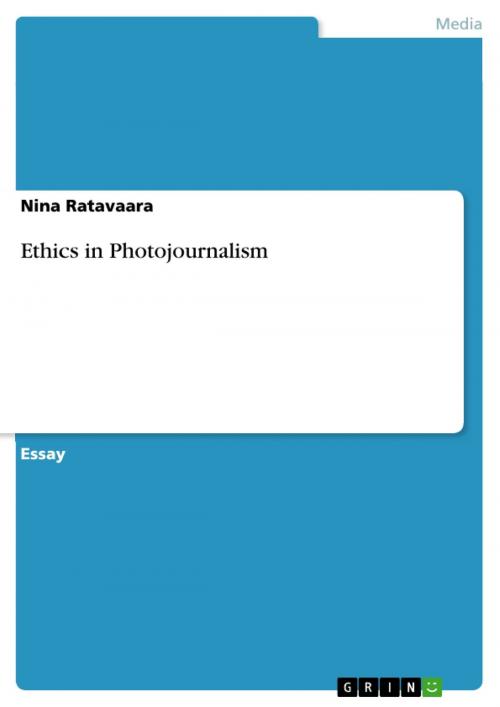| Author: | Nina Ratavaara | ISBN: | 9783656012269 |
| Publisher: | GRIN Verlag | Publication: | September 21, 2011 |
| Imprint: | GRIN Verlag | Language: | English |
| Author: | Nina Ratavaara |
| ISBN: | 9783656012269 |
| Publisher: | GRIN Verlag |
| Publication: | September 21, 2011 |
| Imprint: | GRIN Verlag |
| Language: | English |
Essay from the year 2009 in the subject Communications - Journalism, Journalism Professions, grade: 5,0 => 1,0 (s. Anm.), University of Helsinki (Communications), course: Current Issues in Journalism, language: English, abstract: The Mohammed cartoons, torture photos from Abu Ghraib, videos from school shooting, and pictures from dead bodies in the London terrorist attacks taken by other victims are visual contents that we all had to deal with in the last years. The discussions on the changes for journalists caused by digitalization are ubiquitous. But mostly they focus on decreasing readership numbers, how to reconnect with the public, and on grassroots journalism. Ethical questions usually are concerned with issues such as tabloidization, sensationalism, and emotionalization- in short, quality loss in journalism. Journalistic codes are updated and adapted to the new demands. Other societal debates concentrate on possible negative influences of pictures in news media, video games, music videos, and such- usually containing violence and/or sex. But there is a lack of discourse on ethical challenges concerning photojournalism. During or after a tragedy like school shootings there is lots of talk but the ferocity of those arguments is neither reflected in professional debates of journalists on ethics in photojournalism nor in journalistic codes. However, those issues are gaining importance proportional to the rising significance cameras, picture taking, and visual media in people's lives. This essay therefore is summarizing current debates about journalism ethics, focusing on visual media. Those issues are illustrated with two examples: the Mohammed cartoon-incident and school shootings at the Virginia Tech University, USA and in Jokela, Finland. The question to be answered is what problems exist concerning ethical issues in photojournalism and how they possibly could be improved.
Essay from the year 2009 in the subject Communications - Journalism, Journalism Professions, grade: 5,0 => 1,0 (s. Anm.), University of Helsinki (Communications), course: Current Issues in Journalism, language: English, abstract: The Mohammed cartoons, torture photos from Abu Ghraib, videos from school shooting, and pictures from dead bodies in the London terrorist attacks taken by other victims are visual contents that we all had to deal with in the last years. The discussions on the changes for journalists caused by digitalization are ubiquitous. But mostly they focus on decreasing readership numbers, how to reconnect with the public, and on grassroots journalism. Ethical questions usually are concerned with issues such as tabloidization, sensationalism, and emotionalization- in short, quality loss in journalism. Journalistic codes are updated and adapted to the new demands. Other societal debates concentrate on possible negative influences of pictures in news media, video games, music videos, and such- usually containing violence and/or sex. But there is a lack of discourse on ethical challenges concerning photojournalism. During or after a tragedy like school shootings there is lots of talk but the ferocity of those arguments is neither reflected in professional debates of journalists on ethics in photojournalism nor in journalistic codes. However, those issues are gaining importance proportional to the rising significance cameras, picture taking, and visual media in people's lives. This essay therefore is summarizing current debates about journalism ethics, focusing on visual media. Those issues are illustrated with two examples: the Mohammed cartoon-incident and school shootings at the Virginia Tech University, USA and in Jokela, Finland. The question to be answered is what problems exist concerning ethical issues in photojournalism and how they possibly could be improved.















